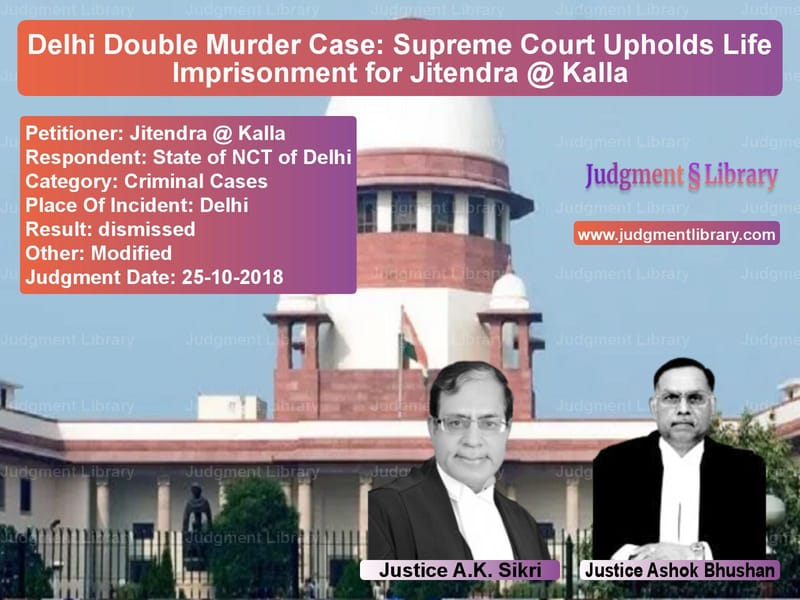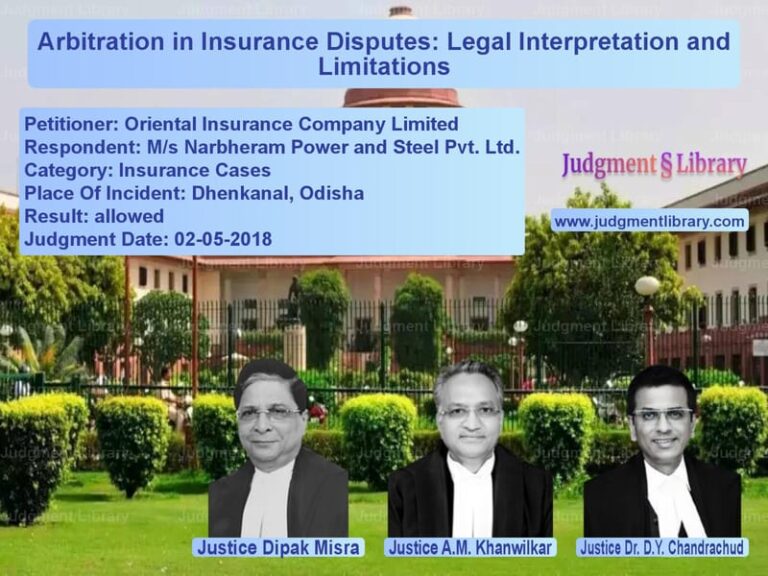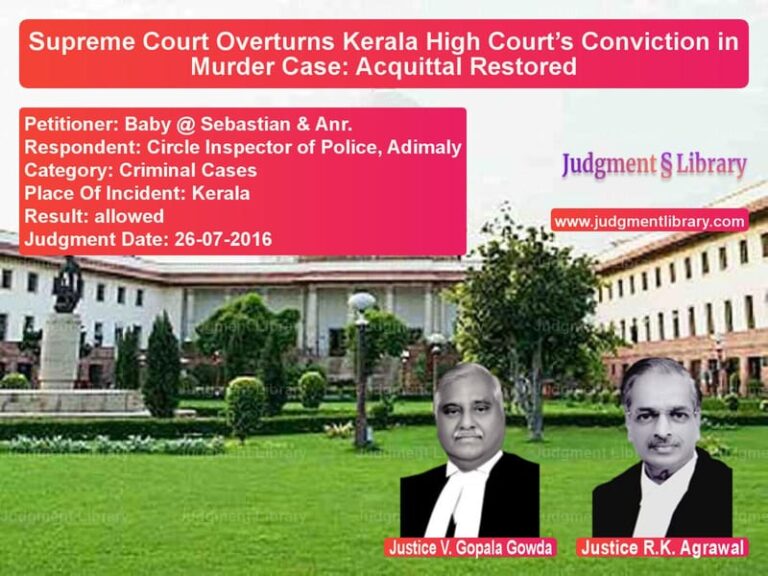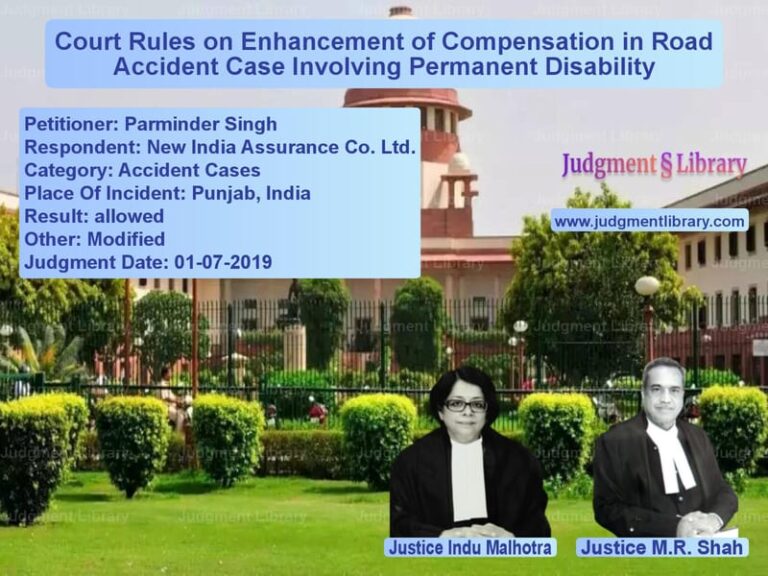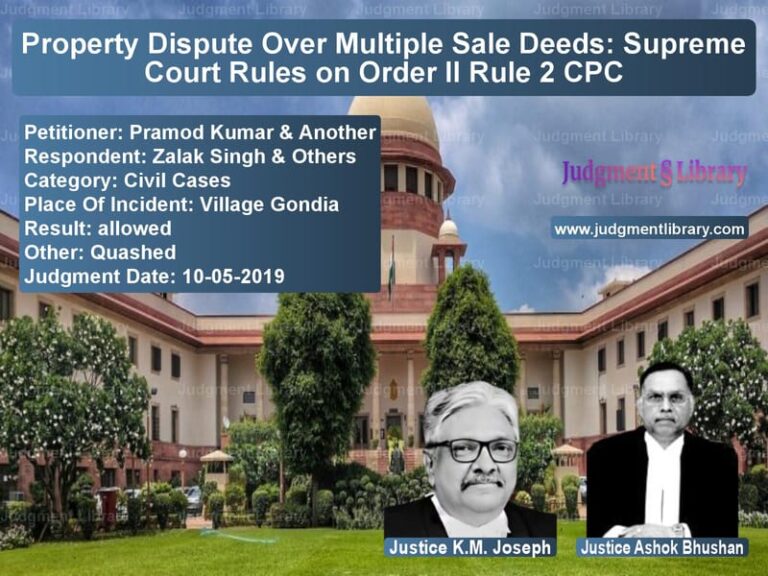Delhi Double Murder Case: Supreme Court Upholds Life Imprisonment for Jitendra @ Kalla
The Supreme Court of India recently ruled in the case of Jitendra @ Kalla vs. State of NCT of Delhi, affirming the conviction and life imprisonment of the appellant for his involvement in two murders that took place in 1999. The judgment, delivered by Justices A.K. Sikri and Ashok Bhushan, upheld the findings of the lower courts while modifying the sentencing to ensure compliance with legal principles.
Case Background
The appellant, Jitendra @ Kalla, was convicted of murdering Anil Badana during a marriage reception on March 10, 1999, and subsequently killing an eyewitness to the crime, Kimti Lal Nayyar, the same night. The case against him was based on two separate FIRs:
- FIR No. 67/1999: Registered under Sections 302 (murder), 307 (attempt to murder), and 34 (common intention) of the Indian Penal Code (IPC) for the murder of Anil Badana.
- FIR No. 68/1999: Registered under Sections 120B (criminal conspiracy) and 302 IPC for the murder of Kimti Lal Nayyar.
Following the trial, Jitendra @ Kalla was convicted and sentenced to life imprisonment by the trial court, with the stipulation that he serve at least 30 years before being eligible for remission. His appeal to the Delhi High Court was unsuccessful, leading him to approach the Supreme Court.
Prosecution’s Case
The prosecution argued that Jitendra @ Kalla murdered Anil Badana in front of multiple witnesses, including Sumit Nayyar, son of the second victim, Kimti Lal Nayyar. Concerned that Sumit might testify against him, Jitendra went to his house in Mukherjee Nagar later that night and shot his father, Kimti Lal Nayyar, when he answered the door.
Defense Arguments
The defense contended that:
- The prosecution relied heavily on circumstantial evidence and the testimonies of biased witnesses.
- The police did not properly investigate alternative suspects or motives.
- The ballistic and forensic evidence did not conclusively link the accused to the crimes.
- There were inconsistencies in the witness statements.
Trial Court and High Court Verdicts
The trial court found the prosecution’s case compelling, particularly the eyewitness testimonies and forensic evidence. It sentenced Jitendra to life imprisonment with a mandatory 30-year term before parole consideration. The Delhi High Court upheld the conviction, rejecting the defense’s claims and emphasizing the gravity of the crimes.
Supreme Court’s Observations and Judgment
The Supreme Court considered three key issues:
- Whether Jitendra’s conviction was legally sound.
- Whether the High Court erred in modifying the sentencing structure.
- Whether the trial court was justified in mandating a 30-year minimum sentence without remission.
The Court ruled:
“The High Court correctly held that the trial court’s findings on conviction were well-founded. However, it erred in modifying the sentence to one already served by the appellant. The appropriate remedy was to ensure that the punishment aligned with constitutional principles and legal precedents.”
Key Findings of the Supreme Court
- The conviction of Jitendra was upheld based on substantial evidence, including eyewitness testimonies and forensic findings.
- The trial court’s sentencing exceeded its jurisdiction by stipulating a non-remittable 30-year term, which was later corrected by the Supreme Court.
- As per precedent, life imprisonment typically means imprisonment for the convict’s natural life, with remission being a matter for executive authorities.
- The sentences for the two murders were ordered to run concurrently instead of consecutively.
Final Judgment
The Supreme Court ruled that Jitendra would serve life imprisonment without any specified cap on remission, aligning with constitutional principles. It struck down the trial court’s 30-year mandate but maintained the severity of the sentence. The Court directed:
“The appellant shall undergo life imprisonment for both convictions, with sentences running concurrently, and his case for remission shall be considered by the authorities as per existing legal provisions.”
Impact of the Judgment
- This ruling reinforces the principle that judicial sentencing must comply with established legal frameworks.
- It clarifies the application of life imprisonment and the role of remission policies in such cases.
- It affirms the importance of due process and the evaluation of mitigating factors in sentencing.
The Supreme Court’s judgment sets a precedent for handling cases involving multiple murders and the sentencing framework applicable in such instances.
Petitioner Name: Jitendra @ Kalla.Respondent Name: State of NCT of Delhi.Judgment By: Justice A.K. Sikri, Justice Ashok Bhushan.Place Of Incident: Delhi.Judgment Date: 25-10-2018.
Don’t miss out on the full details! Download the complete judgment in PDF format below and gain valuable insights instantly!
Download Judgment: Jitendra @ Kalla vs State of NCT of Delh Supreme Court of India Judgment Dated 25-10-2018.pdf
Direct Downlaod Judgment: Direct downlaod this Judgment
See all petitions in Murder Cases
See all petitions in Criminal Conspiracy
See all petitions in Bail and Anticipatory Bail
See all petitions in Judgment by A.K. Sikri
See all petitions in Judgment by Ashok Bhushan
See all petitions in dismissed
See all petitions in Modified
See all petitions in supreme court of India judgments October 2018
See all petitions in 2018 judgments
See all posts in Criminal Cases Category
See all allowed petitions in Criminal Cases Category
See all Dismissed petitions in Criminal Cases Category
See all partially allowed petitions in Criminal Cases Category

